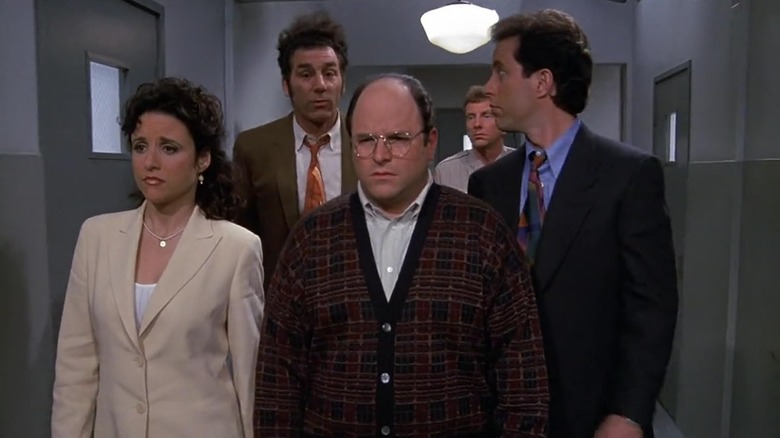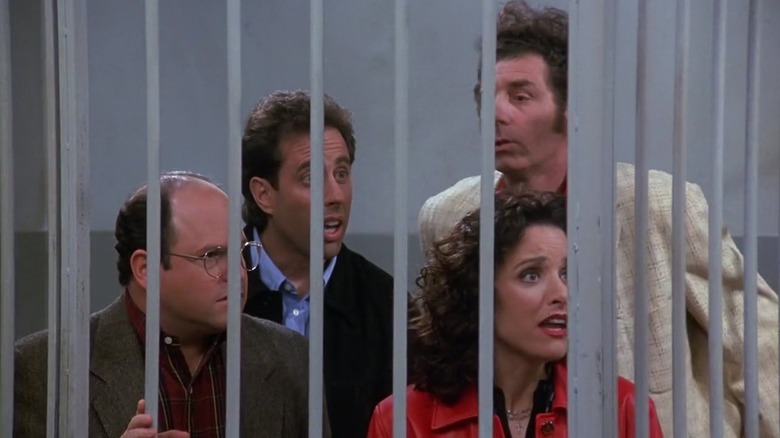How Seinfeld's Newman Actor Wayne Knight Really Feels About The Finale
It's been more than 25 years since the "Seinfeld" finale aired, yet the episode itself remains just as controversial as when it premiered as a one-hour special in 1998. Written by co-creator Larry David, who left "Seinfeld" at the show's creative peak in season 7, the finale takes an unexpected turn by putting the show's gang on trial for violating a Good Samaritan Law after they taunt and film a carjacking victim instead of helping him. Upon sitting down in the courtroom, Jerry (Jerry Seinfeld), Elaine (Julia Louis-Dreyfus), George (Jason Alexander), and Kramer (Michael Richards) are forced to listen as a string of beloved supporting players — including the Soup Nazi, Bubble Boy, and the woman Kramer gave a faulty wheelchair to — parade in to air their grievances about the self-absorbed individuals on the witness stand.
The ending divided critics, audiences, and even those involved with the show. Entertainment Weekly called the episode "off-key and bloated," while USA Today described it as a "dismal" way for the series to end. And although he's frequently defended the finale, even Seinfeld has admitted to having at least one regret about the way it all played out. David, for his part, actually went so far as to use the "Curb Your Enthusiasm" finale to essentially apologize for his misguided choices with the episode over a quarter of a century later.
Actor Wayne Knight, who played the scheming mailman Newman on "Seinfeld," similarly expressed his disappointment in the series finale at Pennsylvania's Steel City Convention in 2022. "I think I'm like the rest of the public as far as the finale goes. I don't think you can end that show in a way that would work," the actor admitted (via ComicBook.com). He made a great point. How do you end a show that prides itself on being about "nothing?" Do you toss the neurotic foursome into yet another zany situation? How big and wild would the antics need to be to sum up nearly a decade of their friendship?
The Seinfeld finale felt like a 'clip show' to Knight
Knight explained that David wanted the show's characters to "have the worst time possible" and receive their comeuppance instead of glory; "[A]s a concept, that works, but I don't know if it works as a finale," Knight mused. Again, he made a fair point. "Seinfeld" fans loved laughing at these despicable characters as they pushed old women out of the way during fires or faked disabilities to avoid work assignments, so the way the finale suddenly devolved into a finger-wagging moral lesson wasn't funny and, worst of all, felt boring. The episode's courtroom scenes are not silly in a sitcom way but, rather, come across as half-baked and unrealistic. While the series always went to extremes with its outlandish shenanigans, it was also grounded in the realities of everyday humor, so the finale's trial (which would never happen in real life) didn't work. Finally, watching the show's foursome end up in jail was just too much of a downer.
The finale might have worked better if it had been structured like a typical episode, with some sort of antic to end all antics. Instead, the final episode of "Seinfeld" comes across as a hackneyed, nostalgic retread of better stories past. Despite returning as Newman himself in the episode, Knight disliked the finale's slew of guest stars and callbacks because "the idea of doing a retrospective winds up feeling like a clip show."
So, just as Knight observed, perhaps "Seinfeld" was always doomed to end on an unsatisfying note, which is why the finale, to this day, remains our top contender for the worst "Seinfeld" episode ever. David turning it into some weird moralistic lesson made the series bow out on a really sour note.

